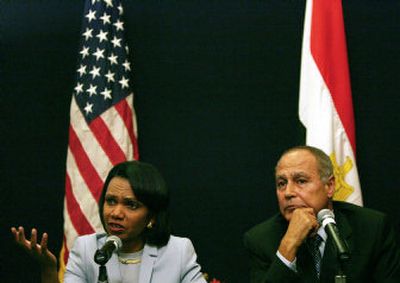Arab allies talks stall

CAIRO, Egypt – The Bush administration’s effort to foster a bloc of moderate Arab states to stand against growing militancy in the Middle East has come up against a brick wall, with several close U.S. allies bluntly telling Secretary of State Condoleezza Rice on Tuesday that they do not want to be pitted against other Arab governments and movements, according to senior Arab officials.
The solution, the allies told Rice, lies with stronger U.S. leadership in solving the Arab-Israeli conflict.
During talks Tuesday in both Saudi Arabia and Egypt, Rice was confronted by friendly but firm pressure from eight Arab governments – Egypt, Jordan, Saudi Arabia, Kuwait, the United Arab Emirates, Qatar, Oman and Bahrain – to follow up on promises by President Bush to help achieve a two-state solution in the dispute between Israel and the Palestinians. They also questioned whether the Bush administration still has the energy or full commitment to pull off a solution to the Palestinian issue before he leaves office, officials said.
Arab officials also expressed frustration that the United States seems far more focused on the issue of Iran’s nuclear program. Although Arab states share concern about Iran’s nuclear potential, Rice and her Arab interlocutors sometimes seemed to be talking at cross purposes, according to Arab officials involved in the talks in Cairo. One senior Arab official described the Cairo talks as warm but unproductive.
After talks with Rice in Jiddah on Tuesday, Saudi Foreign Minister Saud al-Faisal called on the Bush administration to restart the peace process, warning that the issue had become like a disease that weakened the body’s ability to deal with all other diseases.
“There is a very short step from extremism to terrorism. And ever since the problem arose of Palestinian-Israeli conflict, the region has been destabilized,” Faisal said at a joint press conference with Rice.
After afternoon meetings in Cairo, Egyptian Foreign Minister Ahmed Aboul Gheit said foreign ministers from the eight Arab countries told Rice of the urgent need to push the peace process forward “as envisioned by President Bush. … After all this suffering, we must achieve it,” he said at a joint news conference.
Rice is scheduled to fly to Israel today for talks with the Palestinian Authority’s president, Mahmoud Abbas, and Israeli Prime Minister Ehud Olmert.
At the news conference with Aboul Gheit in Cairo, Rice said she was pleased to hear ideas from Arab allies about how the United States might further support Abbas. But Arab officials said they are increasingly concerned that, since the cutoff of tax revenues by Israel and aid by foreign governments since Hamas formed a government, an already serious humanitarian problem has deepened.
Arab foreign ministers also made clear to Rice that they do not want a group of Arab states that she assembled last month at the U.N. General Assembly to be considered a formal bloc, Arab officials said.
The group, referred to as the “GCC plus two,” comprises the six oil-rich sheikdoms in the Arabian Peninsula, plus Egypt and Jordan.
On Iran, Aboul Gheit said the Arabs listened to Rice but did not agree to any statement or action.